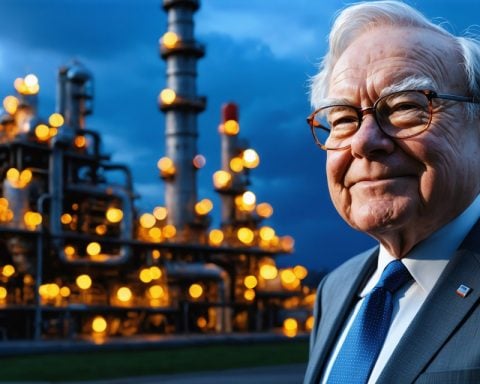In a fascinating turn of events, Berkshire Hathaway has shaken up its investment strategy this quarter, revealing surprising decisions made by Warren Buffett and his team. The latest 13F filing provides insights into these strategic changes, highlighting the company’s direction in its publicly traded equities.
Although Berkshire Hathaway remains a powerhouse with a $266 billion portfolio, the recent third-quarter revelations came as a shock to many. Companies like Apple (AAPL), American Express (AXP), and Bank of America (BAC) continue to dominate the portfolio. However, the most eyebrow-raising news was the massive reduction in Apple shares, with Berkshire unloading over $20 billion of the stock. This followed an earlier $90 billion sale, cutting Apple’s portfolio share from over 50% to around 26%.
Despite this sell-off, Berkshire still maintains a concentrated portfolio, with a majority of its investments tied to financials, consumer staples, and energy. The company’s strategic overweighting in energy is reflected in its significant holdings of Occidental Petroleum (OXY) and Chevron (CVX).
Berkshire has also introduced two new names: Domino’s Pizza (DPZ) and Pool Corporation (POOL), albeit with modest stakes. Meanwhile, the departure of Floor & Decor Holdings (FND) from the portfolio marks another significant change.
Furthermore, the company has strategically reduced its positions in companies like Capital One Financial (COF) and Ulta Beauty (ULTA), emphasizing a shift in focus within the financial sector.
Berkshire’s prudent approach continues to underline its commitment to profitability and strategic growth, capitalizing on market conditions to build an impressive cash reserve exceeding $300 billion. Buffett’s measured confidence in holding cash highlights its potential in a volatile market landscape.
Unexpected Ripples: How Berkshire Hathaway’s Latest Investment Moves Impact Broader Markets
The latest strategic shifts by Berkshire Hathaway in its investment portfolio have not only raised eyebrows but have also initiated discussions on broader economic implications. Warren Buffett, Chairman and CEO of Berkshire Hathaway, is known for his long-term investment strategy and cautious approach, yet his recent decisions suggest an intriguing adjustment reflective of today’s market dynamics. These moves have far-reaching consequences that extend beyond the numbers and into the lives of people and communities.
Economic Impact and Community Consequences
Berkshire Hathaway’s $20 billion reduction in Apple shares represents more than just quantitative adjustment. It has prompted a ripple effect across global markets, impacting other investors who often mirror Buffett’s investments. Communities and economies with significant ties to Apple could feel indirect consequences, such as shifts in employment or community investment plans.
Similarly, increasing investments in energy sectors like Occidental Petroleum and Chevron highlights the ongoing debate around fossil fuels versus sustainable energy sources. Communities dependent on oil and gas industries might see a short-term economic boost, yet such investments can also delay the transition to greener energy alternatives, raising questions about long-term community health and sustainability.
Exploration of New Territories
The introduction of Domino’s Pizza and Pool Corporation into Berkshire’s portfolio reveals Buffett’s subtle nod towards retail and leisure industries, sectors that are integral to everyday consumer life. This may signal confidence in consumer discretionary spending, providing a potential uptick in jobs and economic activity related to leisure and hospitality, particularly as economies continue to recover from the pandemic’s impacts.
Advantages of a Dynamic Portfolio
A diversified portfolio approach helps mitigate risks, offering a cushion against sector-specific downturns. By broadening investments, Berkshire offers stability to its shareholders, enhancing overall market confidence. These strategic shifts can encourage other investors to perceive a wider array of sectors as viable investment opportunities, ultimately influencing market volatility positively.
Controversies and Disadvantages
On the flip side, modifying investment focus brings the risk of unpredictability, challenging sectors suddenly deprived of Berkshire’s substantial backing. For instance, moving away from companies like Ulta Beauty and Capital One could incite volatility and concern within those industries, which may lead to potential layoffs or reduced corporate growth strategies.
Furthermore, Berkshire’s persistent liquidity strategy, with over $300 billion in cash reserves, can be seen as both a safety net and a missed opportunity for higher returns through potentially lucrative but underinvested opportunities.
Key Questions and Answers
– Why did Buffett decrease Apple holdings so significantly?
This might reflect a tactical diversification rather than a lack of confidence in Apple, intended to reallocate substantial resources in sectors believed to hold emergent potential or to stabilize the portfolio amidst tech volatility.
– Could the focus on energy stocks affect green initiatives?
Yes, a significant investment in traditional energy can slow investment in renewable alternatives, potentially influencing policies and community initiatives focused on sustainability.
Conclusion
Buffett’s decisions continue to fascinate investors and market analysts worldwide, sparking discussions on the interplay between corporate strategies and their broader implications. Whether seen as a masterstroke of diversification or a cautious approach to turbulent times, Berkshire’s recent chess moves in the financial world emphasize the intertwining of investment decisions with economic and societal trends.
For more detailed insights, explore the world of investing and corporate strategy at Berkshire Hathaway.





















